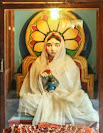The Festival of Lights
We had been in the US for just a few years when our then six-year-old walked into the house announcing how we must have a turkey dinner that Thanksgiving. Everyone at school was talking about it, and he had just learned some great stories about Thanksgiving. We nodded at the stories without complicating the conversation with the questionable origins of the holiday, as we were ready to give this family holiday tradition a try. After all life is about new experiences and what can be better than when food and the whole family are involved! Having been raised in India, growing up we were exposed to Christmas and Ramadan besides other holidays. On moving to the US we used to put up a Christmas tree with presents, got kids’ pictures with Santa and enjoyed a feast with the family on Christmas day. But we had never celebrated Thanksgiving at home, although we knew about it at work and in the context of Black Friday shopping.
Being busy working parents with young children at that time, Indian festivals had been difficult to celebrate as well. When my little one walked in with a wish to celebrate Thanksgiving, I was reminded of how we had glossed over Diwali that year. Diwali usually falls on a weekday, and in the hustle bustle of work, school and other activities, this most important Indian holiday got scrunched in a small, tired window of a forced ritual. Of course we never imagined celebrating the five days of Diwali like we did in India. However, we had hoped to introduce our kids to the origins and meaning behind the holiday and at the very least continue the traditions to stay connected to our roots. While we embraced this new holiday of Thanksgiving, I promised myself not to lose a very important part of our tradition and culture and make an effort to celebrate Diwali the best we could in all the following years.
As luck would have it, our next move happened to be in a diverse community with a significant Indian population. We learned that a committed group of Indians in our town had been organizing a Diwali celebration on a weekend after the actual festival. It was a grand evening with food, socializing and cultural programs. While the weekend celebration is everything one could have hoped for in a foreign land, the true satisfaction was celebrating the festival on the day of!
In trying to keep up with the traditions, we prepare for our celebration ahead of time. We make the traditional sweets and savory over the weekend before the festival. On the day of, we try to get back from work early, or if possible take the day off. We dress up in our Indian best, decorate the house with lights, light diyas (little lamps originally filled with oil and a cotton wick, more conveniently substituted with tealight candles for safety), share goodies with friends and family and in celebrating the victory of good over evil, we pray for everyone’s prosperity and wish light and life for the whole community. Sometimes the lengthy prep gets us way into the night. Our enthusiasm for celebrating the festival isn’t always shared by our kids as they grow older with more school commitments. “Do I have to wear Indian today? I have no time. I have a test tomorrow.” or “Can I skip pooja(prayer)? I don’t think I can get ready on time”. We longed for the eventuality when this day would be stress free for our family to celebrate without any impediments or distractions.
Over time we saw many teachers at the school accepting the holiday and allowing our kids no homework on that day. However, that one day of respite overloaded them on other days as they scampered to catch up on missed work. There was more progress in our town four years ago, when a town parent, Deepika Prakash - true to her name, which coincidentally embodies the essence of Diwali, and means the light from a lamp - petitioned the town to add the holiday on the school calendar, so that Indian kids would feel they belonged and that their Indian culture means something. The school district considered and complied with her request and the holiday was added to the calendar, as was a district-wide policy of no homework that day. However, the kids still have to go through a whole day of school and balance the holiday in a short time window in the evening.
“If we take pride in living in a diverse community, we have to be willing to do the work to support and celebrate the needs of all its community members,” said Deepika in a recent school committee meeting. “Diwali is extremely joyous but also a stressful time for many” and went on to say how in the holiday spirit it is important to give time to celebrate with their families and include the whole district. Indians being an inclusive community, and wanting to share their festival; in the way they celebrate Thanksgiving or Christmas or Eid and learned about Easter, Hanukkah, Rosh Hashanah, Yom Kippur and the Lunar New Year; she represented many Indians in the town when she said “...putting Diwali on the calendar but not giving the day off has eclipsed the beauty of this Festival of Lights which we would like to celebrate with everybody around us.”
Rohan Ravindran, a Junior at ABRHS,
represented the Student Body that evening with a powerful speech on how important it is to recognize the existence of half of the population in the school district by acknowledging holidays representing different cultures in the school calendar. To him, Deepavali represents the triumph of light over darkness. "Nowhere in our history this has been more present than right now as we battle the pandemic". Rohan went on to say that Deepavali represents a strong human belief in the good of others and most of all the hope that we all share that this world will get better. Rohan, who feels strongly about the inclusion of Diwali as a day off, was thinking about his little sister Vibha, who is in the elementary school and brother Sanjay and other kids to celebrate the festival. With this powerful message Rohan brings a lot of hope.
With the changing demographics of the town, this is a challenging problem to solve for the school district. However, by adding Diwali as a day off, it allows not only the Indians in town to celebrate a festival stress free, but introduces the beauty of this festival for others to enjoy and spread the light. It sets an example in inclusion in the true sense of the holiday season. And it will allow students, teachers and parents a day to rejuvenate. As the clocks fall back and the days get darker, how better than to add another opportunity to brighten the nights with light and warmth and a recognition and appreciation of another culture! The Acton-Boxborough Indian population sincerely hopes that the district makes such a change.















Beautiful writing, as always Gauri!
ReplyDeleteThanks Sameera!
DeleteGauri, you write so well. You engage your readers so well.
ReplyDeleteThanks! I am glad you liked my writing and post. It is great to receive feedback.
DeleteWhat a nice blog ! It makes me feel so proud of our meaningful festivals that brings joy and fun for our lives with kind thought... thank you.
ReplyDelete